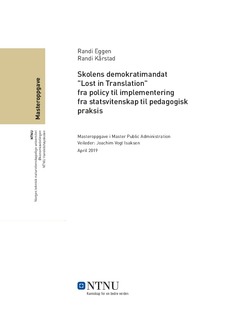Skolens demokratimandat. "Lost in Translation" fra policy til implementering fra statsvitenskap til pedagogisk praksis
Master thesis
Permanent lenke
http://hdl.handle.net/11250/2609680Utgivelsesdato
2019Metadata
Vis full innførselSamlinger
- NTNU Handelshøyskolen [1619]
Sammendrag
Demokratimandatet og opplæring til demokratisk medborgerskap er et viktig aspektved skolens samfunnsmandat. Fagfornyelsen av Kunnskapsløftet innlemmer opplæring tildemokratisk medborgerskap som ett av tre gjennomgående tema i grunnskole ogvideregående opplæring og styrker således demokratiopplæringen i norsk skole. Hvordan kanlæreplanens kompetansemål omgjøres til demokratiske grunnverdier som blant annet respekt,likeverd, kritisk tenkning og toleranse, og hvilket fremtidig demokratisk ideal skal norskskole legge grunnlaget for? Nyere forskning kartlegger ungdoms forståelse for demokratiskeprinsipper, prosesser, verdier og holdninger og knytter skolen som den sentrale arena for ådanne demokratisk bevisste medborgere. Samtidig viser nyere norsk forskning at skolenstolkning av mandatet er uklart og ikke entydig.
I denne oppgaven drøftes problemstillingen “hvordan utfører den videregående skolenopplæring til demokratisk medborgerskap i tråd med sitt mandat?” For å belyse hvoromforent demokratimandatet er, slik det er uttrykt i læreplanverket og tolkes ut i skolene avskoleledelse og lærere, bruker vi funn fra nyere norsk pedagogisk samfunnsforskning ogillustrerer disse ved bruk av egen innsamlet empiri ved to videregående skoler i Trøndelagfylkeskommune. Forskningsspørsmålene vi stiller er: 1) Hvor omforent er skoleledelsens oglærernes forståelse av oppdraget demokrati og medborgerskap? 2) Hvordan bruker skolenulike nettverk for å ivareta elevenes dannelse til å bli en aktiv, demokratisk medborger? og 3)Hvordan kan skoleeier (kommune/fylkeskommune) bidra til å fylle skolens mandat rundtdemokratisk medborgerskap?
Selv om temaet fremheves i styrende dokumenter kan det virke som om det fortsatt erbehov for en tydeligere avklaring omkring implementeringen av temaet i skolen om hvordanbegrepet demokratisk beredskap kan oversettes fra en statsvitenskapelig diskurs til enpedagogisk praksis. Vår undersøkelse tyder på at både skoleledere og skoleeiere ikke itilstrekkelig grad har aktualisert tematikken og presisert, avklart og konkretisert hvordan dettemandatet kan tolkes og ivaretas ut i skolen. Undersøkelsen indikerer også at det arbeidessystematisk på alle nivå i skolesektoren for å identifisere beste praksis og at i den gradmandatet ikke er tilstrekkelig konkretisert er det i påvente av nye styringssignaler fra sentralemyndigheter. Skoleeier i denne undersøkelsen har lagt til rette for ressurser i form av egneombud og lederstillinger i skolen med ansvar for læringsmiljø og elevmedbestemmelse i trådmed skoleeiers tilsyn.
I en kontekst der læreren skal formidle overordnede målsettinger som demokrati ogmedborgerskap innenfor sentralt gitte ressursrammer blant annet nedfelt i læreplanene ogopplæringsloven, kan dette komme i konflikt med mange andre målsettinger. I en “NewPublic Management” - tankegang der effektivitet, produktivitet og en kost/nytte-vurderingervektlegges, kan dette lett bli mindre vektlagt. Ikke alle kompetansemål er like tydelige og larseg like lett måle, og kan dermed lett få mindre fokus. Education in democratic values and citizenship is an important aspect of the thenational public school curriculum in Norway. The White Paper No. 28 (2015–2016) (Fag –Fordypning – Forståelse — En fornyelse av Kunnskapsløftet ) signals a renewal of theeducational reform “Kunnskapsløftet 2006” and as a strategic document addresses anenhanced focus on student competencies in democratic values and citizenship . The WhitePaper addresses the delivery of democratic civic and citizenship topics in the Norwegianschool system. How can competencies such as citizenship and democratic values such asrespect, equality, critical thinking and tolerance be translated into pedagogical practice? Whatkind of democratic ideal should the Norwegian school system base itself on: should it be, acommunitarian or a liberal view of democracy? Research and common knowledge show thatschools are prime communities for socializing individuals and educating future democraticcitizens. Yet, new research conducted shows that teaching democratic citizenship is not asstraightforward as may first seem and that pedagogic practises vary considerably, even withinschools and between teachers.
This thesis discusses the issue “how Norwegian high schools perform their mandate indemocratic education”. To illuminate this question we use findings from pedagogicalresearch and empirical data from two high schools in Trøndelag. In the discussion of the mainissue we divide the issue into four research questions: 1) How unified are school managementand teachers in agreeing on the interpretation of the democratic mandate? 2)How do schoolsinvolve external networks in their democratic education? 3) How can school owners (themunicipality/county) assist the schools and the school leaders to fill their democraticmandate?
The analysis indicates that the implementation of the new curriculum topicsdemocratic values and citizenship appears to lack clarity despite the aims for competenciesexpressed in central governmental policy documents. One of the challenges seems to lie inthe difficulty of translating political science terminology into pedagogical practices. Anotherchallenging obstacle lies in the many different understandings of the purpose of education.Our study indicates that both school leaders and school owners need to address these issuesfurther and mobilise the many stakeholders with a view to determining how this mandate canbe put to best practise into schools. Much systematic work is being done at all levels in theschool sector in this area, but perhaps what is lacking is coordinated efforts to refine andtarget implementation at the local level.
There are many pedagogic objectives for a teacher to target; superior objectives,professional objectives and interdisciplinary objectives such as democratic values. Theseobjectives may conflict. In the thinking of a “New Public Management” where efficiency,productivity and cost/benefit analysis are emphasized, the interdisciplinary objectives may beabandoned. Objectives which are not easy to measure may suffer in the competition amongstall the objectives. As education with respect to citizenship and democratic values areinterdisciplinary objectives of the school system, particular care must be made to ensure thatthey are not abandoned or devalued because of the simultaneous pursuit of other objectives.
